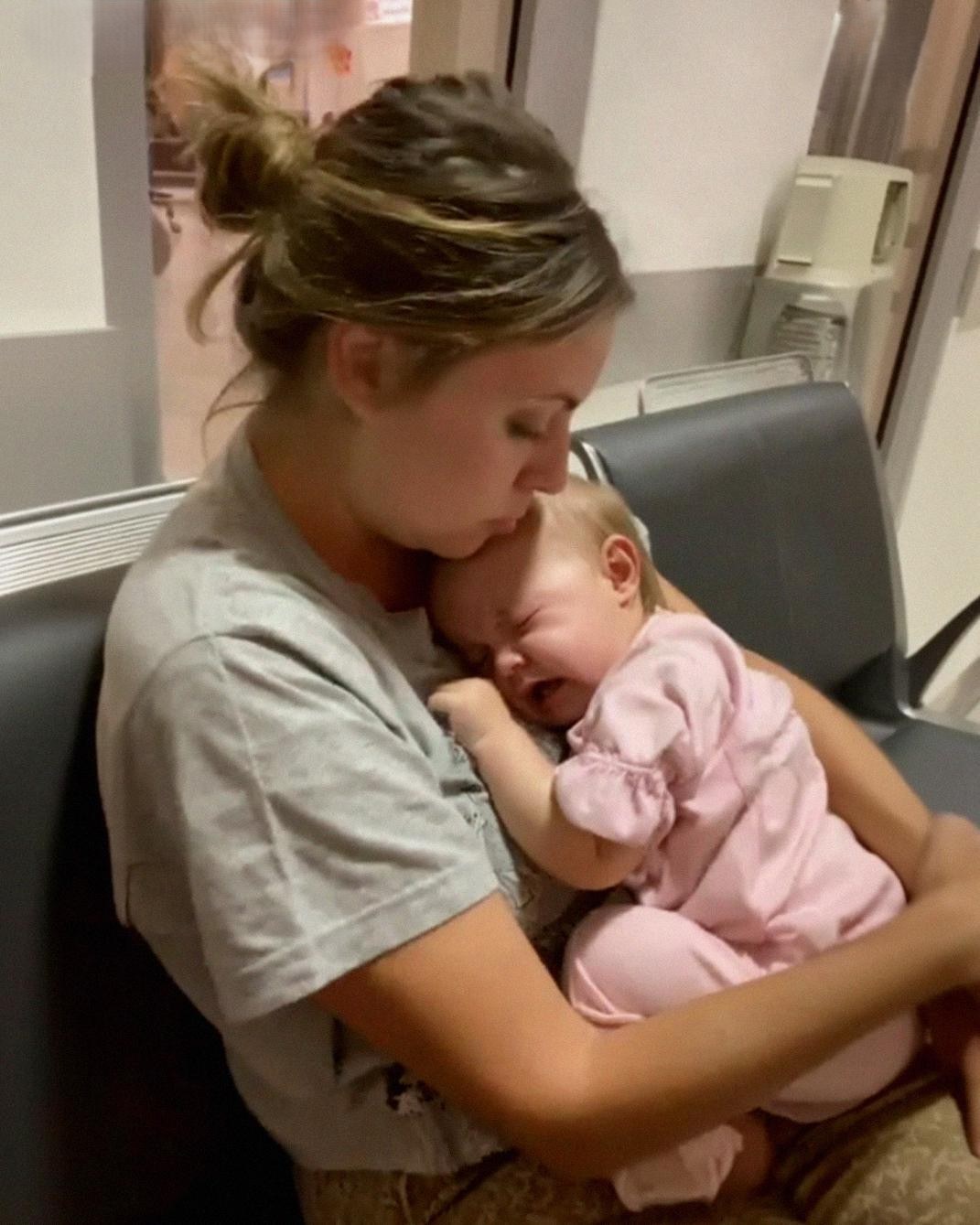For many parents, the emergency room is a place filled with fear, uncertainty, and helplessness. But for one weary mother of a newborn, it became a stage for compassion, courage, and quiet resilience in the face of blatant arrogance.
At 2 a.m., just weeks after delivering via C-section, she slumped into a hard plastic chair, clutching her feverish three-week-old daughter, Olivia. The baby’s cries were relentless, hoarse from hours of screaming. Her tiny chest rose and fell rapidly, her forehead hot to the touch. The new mother’s body ached from surgery, and her mind was clouded from sleepless days. Whispering “Mommy’s here” over and over, she felt the words barely penetrate the shrill noise of her daughter’s suffering.
Across from her, a sharply dressed man flashed gold under the harsh fluorescent lights. His polished appearance clashed sharply with the tension of the waiting room. Instead of empathy, he offered only disdain.
“Unbelievable,” he muttered, gesturing toward the mother. “We’re prioritizing that? A single mom with a screaming kid? I pay for this system.”
The nurse at the desk, Tracy, remained calm but firm. “Sir, we treat based on urgency.”
He scoffed louder, making sure everyone in the waiting room could hear. “I could’ve gone private. My clinic’s full. Now I’m stuck with charity cases.”
The mother kissed her daughter’s damp forehead, fighting tears. Exhaustion pressed heavily on her, yet before despair could take over, the double doors swung open. A doctor in scrubs entered with purpose, scanning the room. He didn’t glance at the man in gold. His eyes went straight to the newborn.
“Baby with a fever?” he asked, already pulling on gloves.
“Yes,” she said, clutching Olivia tighter. “She’s three weeks old.”
“Follow me,” he said without hesitation.
The man in the suit sprang to his feet, tugging down his sleeve. “Excuse me! I’ve had chest pain for an hour. Could be a heart attack.”
The doctor turned, voice steady and firm. “You’re not pale, not sweating, no shortness of breath. You walked in fine and spent twenty minutes harassing my staff. I’ll bet you strained a pec swinging a golf club.”
A suppressed laugh rippled through the waiting room. Tracy’s lips twitched, but she said nothing.
“This infant has a fever of 101.7,” the doctor continued, now sharp with authority. “At three weeks, that’s an emergency. Sepsis can develop in hours. She goes first. And if you ever speak to my staff like that again, I’ll personally escort you out.”
The room went silent. Then a single clap, followed by more, until the waiting room filled with applause. Tracy caught the mother’s eyes and mouthed: Go.
The Exam That Restored Hope
In the exam room, the doctor—whose badge read ROBERT—focused fully on Olivia. He asked clear, precise questions while gently examining her. He checked her skin, breathing, and tiny belly, all while explaining each step.
“Good news,” he said finally. “This looks like a mild viral infection. No signs of sepsis or meningitis. Lungs and oxygen are fine. We’ll bring down her fever and keep her hydrated. You did exactly the right thing by coming in.”
Relief washed over the mother. She sank into the chair, whispering, “Thank you.”
Later, Tracy returned carrying two small bags. Inside were formula samples, diapers, wipes, bottles, and a soft pink blanket. On top lay a handwritten note: You’ve got this, Mama.
“Donations,” Tracy explained with a gentle smile. “From other moms… and some of us too.”
The mother’s voice cracked. “I didn’t think anyone cared.”
“You’re not alone,” Tracy replied simply.
The Quiet Power of Strength
By the time Olivia’s fever broke, her cries had softened into sleepy sighs. Wrapped in the donated blanket, she finally looked peaceful. The mother gathered her things, steadier now, and walked back toward the waiting room.
The once-loud man sat red-faced, arms crossed, gaze fixed anywhere but on her. No one applauded this time, but the silence said enough. She looked directly at him and offered a small smile—not smug, not mocking, just steady. A smile that said: You didn’t win.
Stepping outside, the night air felt cleaner than it had in weeks. Holding her daughter tightly, she walked to the car, stronger, grounded, and no longer invisible.
A Story Every Parent Can Feel
This story is more than just a confrontation in a hospital waiting room. It reflects themes every parent knows:
Compassion in healthcare – The doctor’s swift prioritization potentially saved a child’s life, proving that urgency and humanity outweigh wealth or entitlement.
Motherly resilience – Exhausted and overwhelmed, the mother fought for her newborn, exemplifying quiet strength during sleepless nights and fear-filled moments.
Community support – The donated supplies and note symbolized reassurance that no parent is truly alone. Small acts of kindness can turn despair into hope.
Calling out entitlement – The doctor’s firm boundary taught that arrogance does not outweigh empathy.
The ER can be chaotic, but that night it became a stage for courage, humanity, and hope. A newborn’s cries exposed entitlement, a doctor’s words restored dignity, and a nurse’s kindness reminded a mother she was not forgotten.
For every parent who has sat terrified in a waiting room, this story resonates. Arrogance may make noise, but compassion leaves a lasting impact.
As the mother left, the world outside hadn’t changed—but she had. She was no longer just a sleep-deprived parent in pajamas. She was a mother who faced judgment, held her head high, and carried her daughter along with the knowledge that kindness still outshines cruelty.
